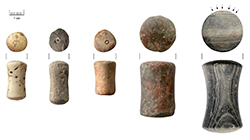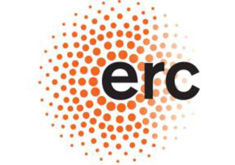Weight and Value
– Tracing the assessment of material value through the early Metal Ages in Europe and Western Asia
Lecture by Dr. Lorenz Rahmstorf, associate professor at the Saxo Institute.

Early Bronze Age artefacts, which have been identified as weights. Found at Tiryns, Greece. Photo: Lorenz Rahmstorf.
Value assessment and the social life of things
It is generally agreed that the concept of value is a social construct and thus defined by the cultural context in which it is created. The material value of objects may have been defined in ancient times by largely stable factors such as labour/investment and scarcity of the material or rather by context-dependent situations: exchanged commodities embody value (“the social life of things”).
Material documentation
Bronze Age written sources form Ancient Mesopotamia document the preservation of conventional value relations of commodities set on the basis of the weight of the objects or materials. While such sources are lacking for societies of the third and second millennium BC in Europe, the basic artefacts (weights and scales) are preserved, but often insufficiently investigated or not even identified. The question therefore arises to what extent defined value regimes existed beyond Eastern Mediterranean/Western Asian civilisations.
Understanding the earliest commercial economies in the world
The lecture will give an overview of the present state of this research regarding Europe and Western Asia in the early Metal Ages and elucidates the potential of new research for a deeper understanding of the nature and extent of the earliest commercial economies in the world.
The lecture will take place in room 12.0.37, KUA 2, Karen Blixens Vej 4, Copenhagen, at 2.15 pm, October 2nd, 2015. All interested are welcome.
European funding

Lorenz Rahmstorf has been awarded an ERC Consolidator Grant of € 1.9m this year to conduct the research project "Weight and Value: Weight metrology and its economic and social impact on Bronze Age Europe, West and South Asia".
You can read an interview with Lorenz Rahmstorf ("Weights will shed new light on prehistoric trade and economy") concerning the project.
